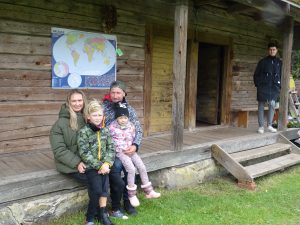“Meeting in Latvia” – this was the name of the networking event for the families of migrants living in Vidzeme, which took place in Liepaja.
“This year, at least in Vidzeme, there is less interest in returning,” says Eva Meijere, coordinator of the Vidzeme planning region for migration issues, and says there was a lot of interest at the beginning of the year. . Then Russia invaded Ukraine, many started doubting whether to return and no one decided to postpone the plan for a while. “If not because of the war, now because everything is getting more expensive, people are thinking about how to make money and survive. These are rational considerations,” reveals E. Meyer.
Unfortunately, there is no precise information on how many people have returned, how many are planning to do so. The planning region of Vidzeme only knows those who are interested in the opportunities and support that will be available in Latvia upon their return.
“” Meeting in Latvia “- it was an opportunity for foreign residents who came back to meet and get to know each other. We had thought of organizing a children’s camp in the summer, but there was little interest because the children in the families are of different ages . Families with children aged between eight months and 14 years also came to Liepa “, says E. Meijere and stresses that the most important thing is that everyone feels good here and makes contact.
Both families shared their experiences in their home country and how to settle back in Latvia. Everyone rated the psychotherapist Dr. as helpful. Artūrs Mikson’s lecture on how to overcome the challenges of return and how to make the settlement in Latvia as peaceful and harmonious as possible for the whole family. No one admitted that what they heard before would have been very helpful, but now they understand themselves both when they went abroad and now when they come back.
“Each person is different, everyone has their own situation, with what thoughts and feelings they give back. If you didn’t come up with the idea, there are opportunities here, but how our acquaintances will look at us, because we went to heaven, but, you see, we are coming back: it is important to face these feelings. Everyone has to go through their own crisis, it is important to understand what is happening to you, because children react to changes just like talking to them. We have to answer the question: are we ready to change something in us themselves or only in children, “A. Mikson told” Druva “and stressed that early parents should understand what they have lost, what they have gained and then talk to the children. “You have to believe to yourself that the return was the right decision, only then will you be able to tell the children as a fact,” said A. Miksons, adding that it is important how old the children are when they leave for another country. and return to Latvia. “It is up to the parents, to what extent to accept the new identity in the country in which they live, how much to maintain the Latvian”, recalls the psychotherapist.
At the meeting place, in the granary of “Maize mäjas” in Liepa, there is a map of the world hanging on the wall. In it are marked Brazil, the United States, Belgium, Germany, the Netherlands, Great Britain, Norway, Denmark, New Zealand, Australia, Russia – countries from which the compatriots returned to live in Vidzeme.
The Liepis family returned in mid-August. Kaspar from Cēsis was brought to Belgium 14 years ago by the passion of the sportsman, Iveta from Riga went to visit him 13 years ago. “Every year in the summer we went on vacation for two months. This time we decided to stay,” says Iveta, but Kaspars adds: “When we moved to Belgium, we already knew we would be back. We bought a house in Cēsis for four years. ago. I have my company here that works all the time, so when I come back there will be work. ” What was earned abroad was invested for life in Latvia.
Daughter Kat and son Ernests are growing up in the family. “We were lucky to find them a place in school and kindergarten. The children do not feel the changes, the familiar people around them. The ones we visited now are with us every day. Parents and relatives, of course, are happy that we are. returned. Nobody told us to think about whether we should do it, “reveals Iveta.
Participant Inga Madžule had been away from Latvia for 20 years. Ten lived in Australia, the same in Germany. “I didn’t think I’d ever go back, but I did it for the sake of the children. I saw how the children of friends grow up abroad, they can’t talk to their grandparents, they don’t want to go to Latvia. I understood: if we stay, the children will not speak Latvian, there will be no belonging to Latvia. I want the children to speak Latvian, I convinced my husband, he is Australian. He has lived in Latvia for eight years. At first he liked everything here, but the weather, the depressed people and then the covid took its toll, it went back for a while, “says the resident, stressing that making a choice is never easy. they are children, the easier the change will be for them Inga’s family has three children.
Inga says she knows several families who have returned from abroad. “We have a lot in common to talk about. There is also more than a mixed family where you are not Latvian, the meetings of such families are very valuable. We have different experiences both abroad and when we return, we can share them,” he says. česniece and appreciates the meeting of these families as a great advantage for each of them.
During the meeting, the children had their lessons, their parents and all together. There were dances, baked bread and a concert and singing together brought joy.
–


